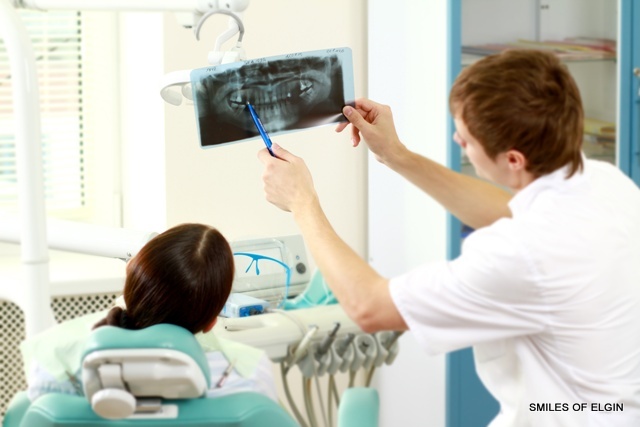1209 Dundee Avenue Elgin, IL 60120
Cracked Tooth
Cracked and fractured teeth are very common dental problems. Some of the reasons why teeth may crack are, for example, biting on hard objects, trauma, grinding and clenching of teeth. All of these behaviors place the teeth under extra pressure and make them more susceptible to cracking.
When tooth enamel is cracked, pain can become momentarily debilitating. When no pressure is exerted on the crack there may be no discomfort at all. However, as the cracked tooth performs a biting action, the crack widens. The pulp and inner workings of the tooth then become exposed, and painful irritation occurs. As pressure is released again, the two parts of the crack fuse back together, and pain subsides. If left untreated, the pulp becomes irreversibly damaged and constantly painful.

Symptoms of a cracked tooth include:
- Unexplained pain when eating.
- Sensitivity to hot and cold.
- Pain with no obvious cause.
- Difficulty in pinpointing the location of the pain.
What kind of cracks can affect the teeth?
There are many ways in which a tooth can be cracked. The specific type of crack will determine what type of treatment is needed. In extreme cases where tooth is severly damaged and the pulp infected, the only solution is extraction.
The following are some of the most common types of cracks:
Crazes – These are generally tiny vertical cracks that do not place the teeth in danger. Craze rarely requires treatment for health reasons, only for the esthetic implications.
Oblique supragingival cracks – These cracks only affect the crown of the tooth and do not extend below the gum line.
Oblique subgingival cracks – These cracks extend beyond the gum line, and often beyond where the jawbone begins. These cracks are painful and may require a combination of periodontal surgery and endodontic treatment to place a crown or other restorative device.
Vertical furcation cracks – These cracks occur when the roots of the tooth separate. This type of crack almost always affects the nerve of the tooth.
Oblique root cracks – These cracks tend not to affect the surface of the tooth at all. In fact, the damage is only apparent below the gum line and usually below the jawbone. Extraction is almost always the only option in this type of cracks.
Vertical apical root cracks – These cracks occur at the apex (tip of the root). Though the tooth does not require extraction from a dental perspective, many patients request an extraction because of the high degree of pain.
Elgin Cracked Tooth Treatments
There are many different types of cracked teeth and some can only be exposed using X-ray machines, while others are clearly visible to the naked eye. Endodontic treatment can be performed in most cases but when the crack is too severe for the tooth to be saved, your Elgin dentist will perform an extraction.
If you have any questions or concerns about cracked teeth, please contact your trusted Elgin dentist.
Office Hours
| Monday | 10:00 to 6:00 |
| Tuesday | 10:00 to 6:00 |
| Wednesday | 11:00 to 8:00 |
| Thursday | 10:00 to 6:00 |
| Friday | 10:00 to 6:00 |
| Saturday | 8:00 to 3:00 |
| Sunday | Appointment only |



Recent Comments